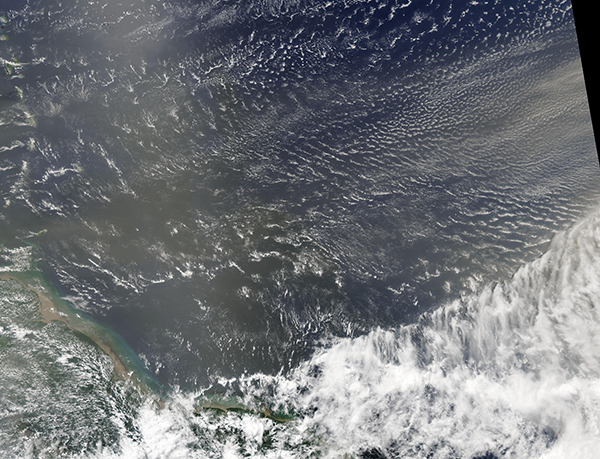Images
May 21, 2022 - Saharan Dust approaching South America
Tweet
On May 19, 2022, a cloud of dust from Africa’s Sahara Desert was captured approaching northeastern South America by the Moderate Resolution Imaging Spectroradiometer (MODIS) on board NASA’s Aqua satellite. The leading edge of a thick pulse of tan dust, which appears to be mixed in with the white clouds, can be seen to the east (right) in this image, sitting about 860 miles (1,85 km) off the coast of Venezuela and heading southwest. A thinner veil of dust has already crossed the Atlantic Ocean to move over the Lesser Antilles, Venezuela, Guyana, Suriname, and French Guiana.
A wide silvery-tan band that crosses the image from north to south is actually caused by an optical phenomenon known as “sunglint”. This occurs when sunlight reflects off the surface of water at the same angle that a satellite sensor views it. The result is a mirror-like reflection of sunlight off water and back at the sensor, creating a silver streak in an image. While the quantity of dust suspended in the atmosphere in the streak of sunglint is the same as the area surrounding it, the streak appears darker due to the sunglint.
The dust seen in this image is just the leading edge of a long train of dust created by repetitive pulses of dust that have blown off of Western Africa from May 12 through May 19. By May 17, the Trinidad and Tobago Weather Center warned that a “significant and high” concentration of dust was set to move across the Lesser Antilles on May 18 – 20, and elevated Saharan Dust levels are expected to remain across that country until May 27. Over the next several days the dust is expected to move northward over the Gulf of Mexico to impact the Gulf Coast of the United States, including parts of Texas and most of Florida, with impacts the heaviest on or around May 24.
Image Facts
Satellite:
Aqua
Date Acquired: 5/19/2022
Resolutions:
1km (2.7 MB), 500m (7.8 MB), 250m (5.8 MB)
Bands Used: 1,4,3
Image Credit:
MODIS Land Rapid Response Team, NASA GSFC
Tweet
On May 19, 2022, a cloud of dust from Africa’s Sahara Desert was captured approaching northeastern South America by the Moderate Resolution Imaging Spectroradiometer (MODIS) on board NASA’s Aqua satellite. The leading edge of a thick pulse of tan dust, which appears to be mixed in with the white clouds, can be seen to the east (right) in this image, sitting about 860 miles (1,85 km) off the coast of Venezuela and heading southwest. A thinner veil of dust has already crossed the Atlantic Ocean to move over the Lesser Antilles, Venezuela, Guyana, Suriname, and French Guiana.
A wide silvery-tan band that crosses the image from north to south is actually caused by an optical phenomenon known as “sunglint”. This occurs when sunlight reflects off the surface of water at the same angle that a satellite sensor views it. The result is a mirror-like reflection of sunlight off water and back at the sensor, creating a silver streak in an image. While the quantity of dust suspended in the atmosphere in the streak of sunglint is the same as the area surrounding it, the streak appears darker due to the sunglint.
The dust seen in this image is just the leading edge of a long train of dust created by repetitive pulses of dust that have blown off of Western Africa from May 12 through May 19. By May 17, the Trinidad and Tobago Weather Center warned that a “significant and high” concentration of dust was set to move across the Lesser Antilles on May 18 – 20, and elevated Saharan Dust levels are expected to remain across that country until May 27. Over the next several days the dust is expected to move northward over the Gulf of Mexico to impact the Gulf Coast of the United States, including parts of Texas and most of Florida, with impacts the heaviest on or around May 24.
Image Facts
Satellite:
Aqua
Date Acquired: 5/19/2022
Resolutions:
1km (2.7 MB), 500m (7.8 MB), 250m (5.8 MB)
Bands Used: 1,4,3
Image Credit:
MODIS Land Rapid Response Team, NASA GSFC




